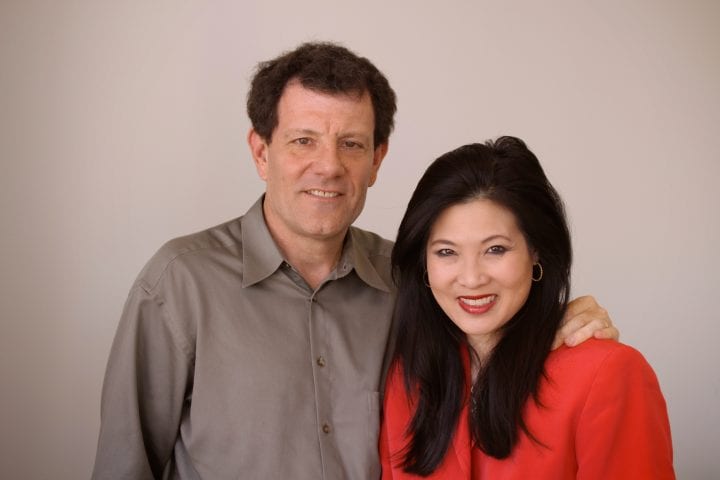
Six Reads by Nicholas Kristof & Sheryl WuDunn
November 26, 2019
New York Times Op-Ed Columnist Nicolas Kristof grew up on a cherry farm in rural Yamhill, Oregon, and it’s there that he and Sheryl WuDunn, his wife and co-writer, return in their latest reporting. In part, their book is about the lives of some of the children with whom Kristof grew up, about a quarter of which have died in adulthood from drug or alcohol abuse, accidents, or suicide.
In Tightrope: Americans Reaching for Hope, Kristof and WuDunn examine this “other America”—areas of the country that have been devastated in the last few decades by the disappearance of blue-collar jobs, and the decades of policy mistakes that have compounded issues like the opioid epidemic and joblessness. Tara Westover, the author of Educated, calls their book “a deft and uniquely credible exploration of rural America, and of other left-behind pockets of our country. One of the most important books I’ve read on the state of our disunion.”
On Wednesday, February 5, 2020, Seattle Arts & Lectures will present Kristof & WuDunn, the first husband and wife to share a Pulitzer Prize in International Reporting, as part of our Journalism Series at Benaroya Hall. Below, local writer Sarah Neilson shares her top six must reads.
By Sarah Neilson
Our century is filled with injustices, but we’d argue that really good nonfiction is one way to galvanize people against them. Sheryl WuDunn and Nicholas Kristof are the husband-and-wife duo behind four such bestselling, critically acclaimed works of nonfiction, focusing on global poverty, health and gender issues, and climate change: China Wakes: The Struggle for the Soul of a Rising Power (1994), Thunder from the East: Portrait of a Rising Asia (1999), Half the Sky: Turning Oppression into Opportunity for Women Worldwide (2009), and A Path Appears: Transforming Lives, Creating Opportunity (2014).
Both are Pulitzer Prize winners—WuDunn was the first Asian-American reporter to win one—and each have their own progressive pursuits outside of their joint writing projects. Kristof has been a New York Times columnist since 2001, and he is regular contributor to CNN; WuDunn is a business executive who focuses on emerging markets, female entrepreneurs, and alternative energy, in addition to her reporting, which includes being a foreign correspondent for the New York Times in Beijing and Tokyo.
Given their remarkable careers in the global fight for social justice, it won’t come as a surprise that the web hosts an impressive body of work by the pair, including articles, interviews, TED Talks, and more. Here are six of the best Kristof-WuDunn pieces you can find on the internet:
1. This TED Talk by Sheryl WuDunn, about Half the Sky, illustrates the vital importance of access to education for women across the world. Why it’s great: WuDunn tells a compelling story about “the real China,” the power of community, and the morality of gender equality (with a good dose of humor, too).
2. This interview with Nicholas Kristof for Spokane-based Spokesman-Review tackles the challenging role of journalists, the state of journalism today, and how social media functions in our current news cycle. Why it’s great: Kristof has hope despite it all, and he lays out some simple points for how we can right the sinking ship of news reporting.
3. This interview with WuDunn for Every Mother Counts tackles the complexity of telling a story about gender inequality, and how local women are the most effective agents for change. Why it’s great: WuDunn has some interesting things to say about storytelling mediums and the responsibilities of holding and carrying another’s story.
4. Kristof’s column on loneliness in a recent issue of the New York Times is a compelling read for anyone who has ever felt lonely. Why it’s great: he takes a measured, multifaceted approach to looking at how loneliness affects people, the interconnectedness of physical and mental health, and the role of economic and social inequity.
5. In this co-authored article for The New York Times Magazine, “The Women’s Crusade,” Kristof and WuDunn go in-depth about how crucial, daunting, and complicated it is to help women gain access to education, capital, and other resources of independence and community building. Why it’s great: this article is kind of like a bite-sized version of Half the Sky, while still being an immersive, complex read.
6. Publishers Weekly recently sat down with Kristof and WuDunn via Skype in one of the first of what will surely be many interviews about Tightrope. Why it’s great: the portrait that emerges in this interview is not just one about two foreign correspondents telling a story about home—it’s also about how two would-be rival journalists fell in love and how they work together in a fascinating partnership.
Sarah Neilson is a freelance writer whose work appears in LARB, LitHub, Electric Literature, Seattle Times, The Millions, Rewire News, and Bookforum, among others. She can be found on Twitter @sarahmariewrote, Instagram @readrunsea, and on her website, sarahneilsonwriter.com.